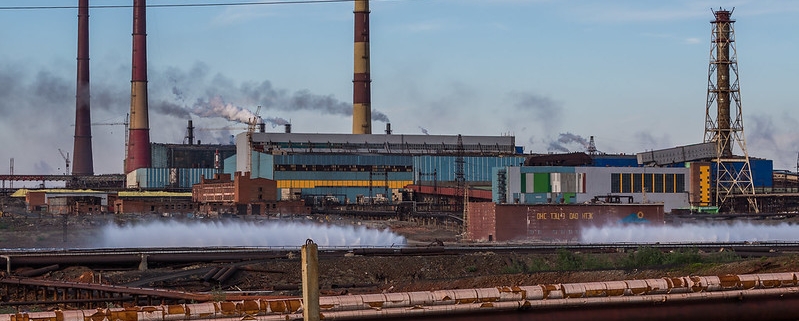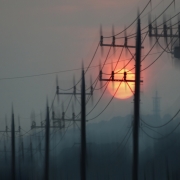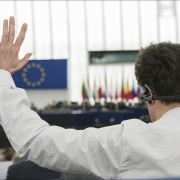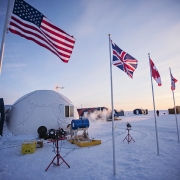An Arctic oil accident that will take years to clean up
Despite the recent freeze of the global economic activity due to the COVID-19 outbreak, climate change continues to accelerate at its own pace, reminding us the detrimental effects of decades’ pollution and greenhouse emissions that have led to the rise of the global temperatures.
One of the most serious consequences is the thawing of the Arctic permafrost, a permanent ice layer that covers large parts of the Arctic Circle; an area of major geo-economic importance both for the environmental sustainability in the north sphere as well as for the economic initiatives due to its significant fossil fuel reserves.
How the recent oil leakage adds to the current environmental pollution
Earlier this month, the news of a 20,000 tons diesel leakage from a Russian reservoir in the Far North, has flooded the internet and the global online media. For Greenpeace, the disaster reminds that of the 1989 Exxon Valdez accident in the coast of Alaska, when 37,000 tons of crude oil leaked from an oil tanker. Generally speaking, an oil spillage accident is quite alarming for Northern countries, whose infrastructure is built on pillars that stand on top of the permafrost. In Russia’s case, one of the big oil-producing countries in the world, such a development poses a major threat to the environment; the thawing ice can cause cracks in roads and buildings.
Considering the risks and costs of the clean-up
The clean-up cost is estimated to cost around $146 million, while the Russian president Vladimir Putin is monitoring closely the situation. It appears that Norilsk Nickel, the company that owns the power plant and is responsible for the oil leakage, failed to notify the Russian Authorities on time.
A two-day delay has led to severe negligence and contamination on the nearby river covering a 350 sq km oil-spillage area. The power plant’s director, V. Starostin has been taken into custody for further questioning from the local authorities. In the meantime, Kremlin is under a state of emergency; the Russian state has deployed extra forces to clean-up the area, which is estimated that it might take up to 10 years to fully clean up.
Obviously, these latest developments seem to get on the way with Putin’s plans to encourage green investment in Russia, which would help the country to transition towards a greener economy. On this basis, it is quite possible that the Russian leader will roll out stricter environmental regulations in the near future.
Testing the responsiveness of the Arctic Council
What remains to be seen is the actions that the Arctic Council will take to protect its neighbourhood. Of course, this tests the responsiveness of the Arctic Council, deciding whether the forum is able to deal effectively under such stressful circumstances to protect its causes.
According to the 2013 Arctic Circle Agreement on Cooperation on Marine Oil Pollution Preparedness and Response in the Arctic, the Arctic members should work together to ‘’protect the marine environment ‘’and ‘’cooperatively respond before it engagers lives and threatens fragile ecosystems’’ (US Department of State). Is this going to happen following the Arctic Council’s achievement in the past or will it reveal another weak spot of the Council?
In the meantime, earlier this May, world media have been alarming the public over the rising temperature in Siberia and Russian’s Far East due to the outburst of agricultural fires and/or wildfires leading to the historic increase in spring temperatures in the area, which adds to the environmental destruction in the area and the accelerated defrosting of the permafrost.
Photo: Ninara, Y1A0093 Norilsk. Krasnoyarsk Krai, Russia. Norilsk Nickel, Nadezhda Plant. (2016). Source: (flickr.com) | (CC BY 2.0)
Bibliography
BBC (2020) Arctic Circle oil spill prompts Putin to declare state of emergency, BBC News, 4th of June, Available at: https://www.bbc.co.uk/news/world-europe-52915807 (Accessed 15th June 2020)
Greenpeace, The Arctic & Global Warming, Available at: https://www.greenpeace.org/usa/arctic/issues/global-warming/ (Accessed 23rd June 2020)
Lobrana M. L. and Fedorinova Y. (2020) Giant Spill in Russia Offers a Glimpse of the Arctic’s Future, Bloomberg Green, 6th June, Available at: https://www.bloomberg.com/news/articles/2020-06-06/giant-spill-in-russia-offers-a-glimpse-of-the-arctic-s-future?srnd=premium-europe (Accessed 8th June 2020)
Pismennaya E. and Quinn A. (2020) Oil Spill Taints Kremlin Plans to Sell $4 Billion of Green Bonds, Bloomberg Green, 15th June, Available at: https://www.bloomberg.com/news/articles/2020-06-14/oil-spill-taints-kremlin-plan-to-sell-4-billion-of-green-bonds (Accessed 15th June 2020)
Wood J. (2019) 4 crazy things that are happening in the Arctic right now, World Economic Forum, 19th July, Available at: https://www.weforum.org/agenda/2019/07/4-crazy-things-that-are-happening-in-the-arctic-right-now/ (Accessed 23rd June 2020)
US Department of State, Office of Ocean and Polar Affairs, Arctic Region, Available at : https://www.state.gov/key-topics-office-of-ocean-and-polar-affairs/arctic/ (Accessed 22 June 2020)





 176th Wing Alaska Air National Guard's photostream
176th Wing Alaska Air National Guard's photostream 

 176th Wing Alaska Air National Guard's photostream
176th Wing Alaska Air National Guard's photostream
Leave a Reply
Want to join the discussion?Feel free to contribute!